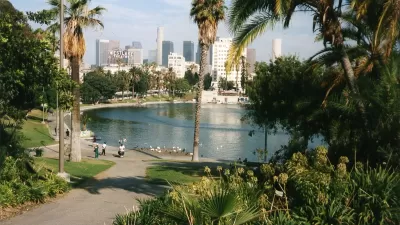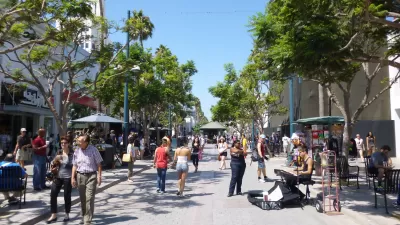Should a business improvement district have an expiration date? That's the question some property owners in downtown Los Angeles are beginning to ask as they chafe at the "aggressive cleaning up" and additional tax assessments that fund them.
Although downtown L.A.'s network of business improvement districts have been credited with helping to turn around the "once-desolate" area and continue to provide "the kind of aggressive maintenance and security services that City Hall simply cannot afford" while helping to "market the area to new investors," lawsuits from property owners who believe they're no longer necessary are challenging their very existence, reports Sam Allen.
"Some critics say the BIDs have too much of a Big Brother feel, describing them as a kind of police force under the control of private executives whose aggressive cleaning up can sometimes feel like harassment. In the arts district, critics have posted bright orange 'RID THE BID' banners and launched a petition online."
But the BIDs are fighting back. "Don't let anyone kid you, the heavy lifting is done by the BIDs," said Estela Lopez, who runs BIDs in the industrial core and arts district through an organization called the Central City East Assn. "We brought the developers here. We brought the investors here."
"Councilman Jose Huizar, who represents much of downtown, went as far as to say it would be 'dangerous' for the city not to have BIDs."
FULL STORY: Some chafe at downtown L.A.'s business improvement districts

Planetizen Federal Action Tracker
A weekly monitor of how Trump’s orders and actions are impacting planners and planning in America.

Map: Where Senate Republicans Want to Sell Your Public Lands
For public land advocates, the Senate Republicans’ proposal to sell millions of acres of public land in the West is “the biggest fight of their careers.”

Restaurant Patios Were a Pandemic Win — Why Were They so Hard to Keep?
Social distancing requirements and changes in travel patterns prompted cities to pilot new uses for street and sidewalk space. Then it got complicated.

Platform Pilsner: Vancouver Transit Agency Releases... a Beer?
TransLink will receive a portion of every sale of the four-pack.

Toronto Weighs Cheaper Transit, Parking Hikes for Major Events
Special event rates would take effect during large festivals, sports games and concerts to ‘discourage driving, manage congestion and free up space for transit.”

Berlin to Consider Car-Free Zone Larger Than Manhattan
The area bound by the 22-mile Ringbahn would still allow 12 uses of a private automobile per year per person, and several other exemptions.
Urban Design for Planners 1: Software Tools
This six-course series explores essential urban design concepts using open source software and equips planners with the tools they need to participate fully in the urban design process.
Planning for Universal Design
Learn the tools for implementing Universal Design in planning regulations.
Heyer Gruel & Associates PA
JM Goldson LLC
Custer County Colorado
City of Camden Redevelopment Agency
City of Astoria
Transportation Research & Education Center (TREC) at Portland State University
Camden Redevelopment Agency
City of Claremont
Municipality of Princeton (NJ)




























